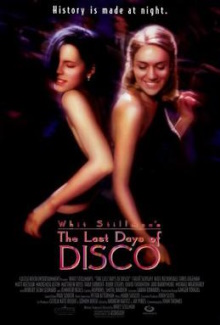I put this onto my watchlist purely because of how much I liked Metropolitan. This is the final part of Whit Stillman’s loose trilogy, skipping over Barcelona because I thought this one sounded more interesting. Just from the self-important dialogue of its young characters, this is recognizably the same type of film. Unfortunately the magic of the first film just isn’t here and the lines just fall flat. There are parts of it that I don’t quite get, It seems earnest about disco culture for example which I don’t understand at all so there may be more of merit here than I could discern. But that doesn’t change the fact that this was a disappointment to me.
Alice Kinnon and Charlotte Pingress are friends and recent graduates from a liberal arts college who work as lowly paid readers in a publishing company. At night they hang out in an exclusive disco which they gain entry to easily due to how attractive they are. Some men find it harder to enter including Jimmy, an advertising executive Alice likes. Des works as a manager there and helps sneak Jimmy in but this upsets his boss. Charlotte keeps giving advice to Alice as the more worldly and experienced of the two, telling her to lay off Jimmy and go for another man, Tom, instead. Alice does so and has a one night stand with Tom only to learn that he already has a long-term girlfriend and Charlotte is actually interested in Jimmy herself. Another friend is Josh who works at the district attorney’s office and heaps praises on the disco lifestyle. He tries to warn Des about the authorities’ investigation of the disco and is interested in Alice, but both Charlotte and Des are disparaging towards him. Alice, Charlotte and another girl Holly eventually scrape the money to rent a small apartment of their own. But the close proximity only makes Charlotte’s catty behavior even worse.
The first film too featured young characters who keep making statements that are too grandiose for the little life experience that they have. They were dumb but their earnestness also made them endearing. Here, the characters are adults who have joined the work force and are trying to make their own way in the world. All of a sudden the dumbness feels less endearing. Des is a playboy who picks up women and then dumps them by pretending to be gay. Alice only pretends to be friends with Charlotte and is only interested in getting a husband with decent prospects. Jimmy doesn’t have much of a personality, simply going for which girl is willing to sleep with him while concentrating on his career. Everything that they have to say for themselves to justify their life choices, or look good in front of others, simply don’t matter at all and are not interesting in the least. It might take a while for Alice to realize how fake the people around her are but we as the audience can see that immediately so it’s unclear to me why Stillman thought we might want to hear them talk.
One contentious question is: exactly what is the film’s attitude towards disco culture? As mentioned, Josh waxes eloquently about the disco scene as a place for young people to have fun and socialize. But then he’s actually something of a square with not much involvement in the scene at all. Meanwhile Des who is most connected of them all uses it to have sex with women and is fully aware of his employer’s criminal activities. For all her big talk, Charlotte seems to only want to get a husband with good prospects. In an early scene, Jimmy’s clients are turned away from the club for being unattractive, middle-aged men. Yet they’re visibly rich so I doubt a club would really turn away their business in real life. Is Stillman saying that the disco scene valued being cool so much more than money? I note that I wasn’t sure how seriously disco is meant to be taken in the Disco Elysium game either. Maybe there really more depth in the subculture than I can see. I just don’t know.
This was a big disappointment to me after I liked Metropolitan so much, yet I wouldn’t say it’s totally a lost cause. It captures a certain positive energy inside the disco that I find appealing even if it’s not my scene and it is amusing as a portrait of the 1990s. I may eventually even go back to watch Barcelona at some point but I can’t recommend this film to most people.
